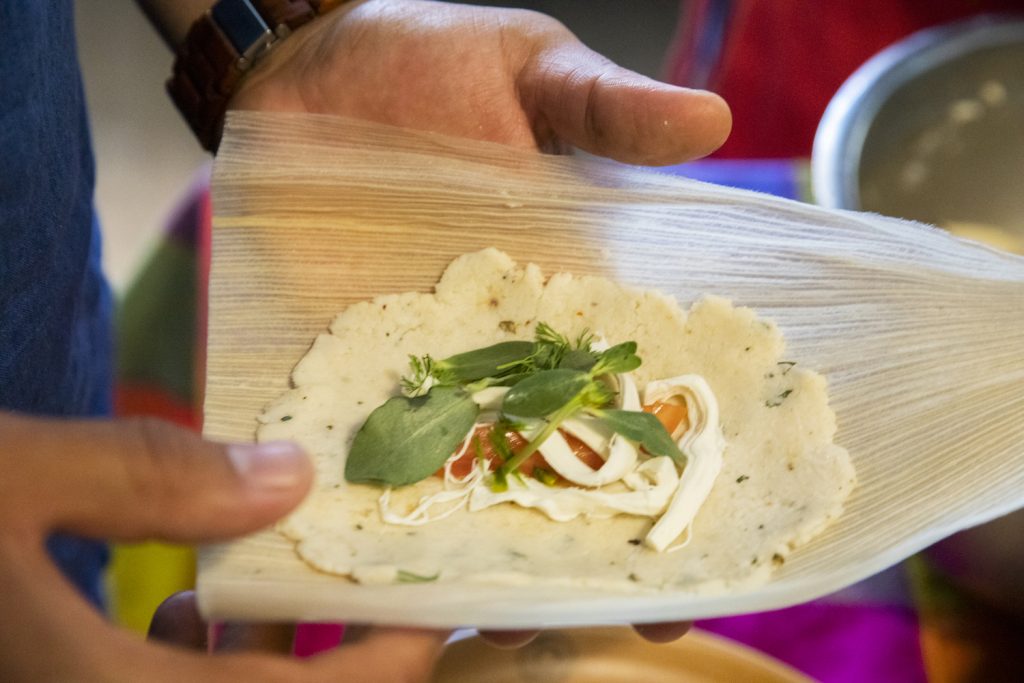Victoria Zuno brings the old country to the new with her tamales

By Kathryn Gonzales
Always, she begins the story at the beginning, the first time she left her mother.
It is the 1970’s and there is violence all around her.
She is 16.
She has left school.
She wears pink sneakers and a knee-length skirt, her mother hands her a red apron, a token of remembrance of her. She ties her black hair back in a ponytail.
She has never been beyond the border of school or home, but now she is.
The promises of how easy it would be over there create dreams of a carefree life in her head.
With her hand holding a cross on her chest she went north to reach these dreams.
It is 4:45 a.m.
The first thing she thinks of when she wakes up is all the things to be done for the day, like a screenshot that she replays minute after minute.
As she rises to get herself ready, she ties her long black hair back making sure there is not a single strand of hair out of place. Her hands go to her rosary around her neck as she bows her head holding on to the cross on her chest, whispering her daily prayers as she walks to the kitchen in her small three-bedroom house.
Victoria Zuno, 59, puts on her signature red apron with sunflowers, washes her hands, and begins by organizing all her ingredients to create the tamales that she is known for on Ninth Street.
“It always starts with the carne [meat], if you don’t get good carne, you might as well not be making tamales”, she bluntly tells her daughter, Esmeralda Zuno, 21, “Remove the bones from the pork and chicken and then the skin, don’t be shy mija [daughter] gets your hands in there.”
Zuno picks the meat of the bone until it is clean, making sure not to waste anything. She gives the chicken bone to her chihuahua, Rocky, to chew.
Her hands are rough as she kneads the masa that contains corn flour, pork lard, and red chile paste. Her hands seep into the dough –taking control, folding repeatedly until it has a consistency that is neither too dry nor too wet. It stays untouched for two hours.
As she moves around the kitchen, the sweat is welcomed, cooling and helping her to feel like she’s reaching her goal; it’s only when her feet come to a stop that she realizes the sheen of sweat covering her back.
She persists, moving one hand to spread a layer of masa [a corn dough] onto a moist corn husk laying flat on the opposite hand, shredded pork drenched in red chile fills the masa and the husk is quickly rolled and tucked in from the bottom.
She repeats this process until her hands go numb.
“I have done this for so long, I feel like I can do this in my sleep”, Zuno whispers as she goes to wake up her children for school. “The whole process of making tamales is imprinted in mis manos [my hands].”
* * *
She moved to Philadelphia from San Ramon, a small town in Mexico where she lived with seven sisters.
In the States, she expected to find dollar bills growing from trees, at least that’s what they said. But nothing is what it was supposed to be. She finds work at a factory, sewing women’s blouses on a sewing machine. Some days she has the sleeves and shoulders that she prods under the pulsing needle, other days she is given two pieces of fabric where she has to find a way to stitch them together.
At 20, she lies in her bed in a shared apartment in North Philly solita [alone], and she cries and wonders, “What did I do?” She thinks about what her mother may be doing in that moment. She imagines them all at the house together, sin ella [without her].
By 8:30 a.m.
With her van, a 2012 Toyota Sienna, loaded with tamales in ollas [pots] and champurrado [Mexican chocolate drink], she is ready to head to her usual spot in the parking lot of a Rite Aid in the Italian Market. Mondays are her pork in red salsa and chicken in green salsa tamale days, an unwritten fact that her customers know.
After arriving, Zuno creates a stand for her tamales by opening her trunk and putting on a fanny pack that contains change. Mere seconds pass, as a line takes form of hungry customers.
“Doña Victoria, these are so good, why don’t you open your own restaurant?” asks Marta Ferandez, 27, a regular customer. Zuno simply laughs to Fernandez declarations and resumes handling customer’s plastic bags filled with steaming tamales.
“She doesn’t let no one touch her tamales,” responds Esmeralda Zuno, who assists her mother in pouring the champurrado in styrofoam cups.
“Enough”, Zuno blurts out to her daughter, her eyes shadowed and deep-set, but not showing any sign of exhaustion.
After 10:00 a.m., Zuno has sold out her 300 tamales and packs the van up and drives home her usual route.

